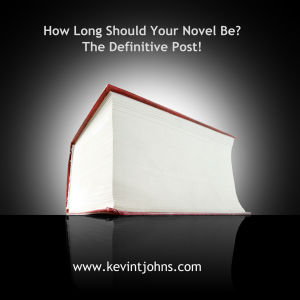Listen to an audio version of this article. Just click the play button below:
Many aspiring novelists ask themselves, “How long should my novel be?”
The answer to this question is surprisingly complex. There are multiple issues that need to be to addressed… and I’m going to cover ALL of them in this article.
So let’s get it!
My Journey
It took me eight years to craft my debut novel, The Page Turners.
Eight years is far too long to spend writing a first book. Looking back, I cringe at the thought of what I could have created in the time I wasted drafting and redrafting that novel.
One of the many reasons it took me so long to write my first book was that, like many rookie authors, I wanted my debut to be an epic story. I had twenty-five years worth of life experiences, thoughts, emotions, and stories to draw from, and I was determined to cram all of it into a novel that would dazzle readers and immediately launch my literary career into the stratosphere of superstardom!
At one point, the manuscript for The Page Turners was up to 130,000 words, but the published version is a little over 55,000; hardly an epic.
But you know what? Stephen King’s first novel wasn’t The Stand. It was a tight-packed little masterpiece called Carrie.
Once I followed King’s lead by focusing on intimacy and letting go of my aspirations of a sweeping and grand narrative, the project finally become manageable. After years spent struggling with this beast of a story, I was suddenly dealing with a focused and fast-paced narrative that had a clear theme and a nice sense of rhythm and harmony.
Before long, finally publishing the book was no longer a distant pipe dream; it had actually become an attainable goal. In shortening the length of my novel, I made my life as a writer much easier.
The Benefits of Short
It’s easier to redraft and review a shorter novel.
It’s easier to convince beta readers to give it a look, and you get their feedback much quicker.
As an indie author, it’s significantly cheaper to pay for copy-editing of a shorter novel, and the production costs of printing the final books are also more affordable.
Across the board, virtually everything becomes easier and more do-able once you commit to shortening your novel.
A shorter book also forces an author to focus with laser-like accuracy on the story’s most important elements: the plot and lead characters. Tangents, supporting characters, and non-relevant aspects of the narrative are kept to a bare minimum because there simply isn’t room for them in a short book.
Tell an enthusiastic young writer you need them to write a 2,000-word article, and there’s a good chance they’ll return with 4,000 words of mostly unusable material. On the other hand, tell them you need 500 words and not a single word more… and they might just come up with something great!
I’m quite fond of the Orson Well’s quote, “The enemy of art is the absence of limitations,” and I think it can be applied wonderfully to word count. Keep the book short, and you’re much more likely to create good art. At the very least, you’ll reduce the chances of creating bad art. (The only thing worse than a bad novel is a bad novel of epic length!)
With all of this in mind, I tell my writing students to aim for a 55,000 word novel for their debut book. A total of 55,000 words is the perfect length for a rookie author. It’s short and sweet, and it forces the writer to stick to the point, something young writers often struggle with. And, of course, as mentioned earlier, it makes the entire project more manageable.
Is a 55,000 Word Manuscript Novel Length?
In his article, “Word Count: How Long Should a Book Be?”, Glen C Strathy turns to The Science Fiction and Fantasy Writers of America’s (SFFWA) criteria for the Nebula Awards to determine his word count criteria.
Here’s how the SFFWA defines the stories they review for the award:
Short story – under 7,500 words
Novelette – 7,500 to 17,500 words
Novella – 17,500 to 40,000 words
Novel – anything over 40,000 words
National Novel Writing Month (NaNoWriMo) (an annual event that challenges writers to craft a novel within the month of November) identifies 50,000 words as the minimum target for their definition of a novel.
As such, by either the SFFWA or the NaNoWriMo’s definition, a 55,000-word book is certainly novel-length.
That said, if you would prefer to turn to general opinion and/or critical regard to determine the minimum length of a novel, consider The Great Gatsby. F. Scott Fitzgerald’s masterpiece is only 55,000 words long, and it’s considered by many – myself included – to be one of the greatest novels ever written.
In fact, a number of my favourite novels of all time are around this length: The Outsiders by S.E. Hinton, Fahrenheit 451 by Ray Bradbury, The Turn of the Screw by Henry James, The Old Man and the Sea by Earnest Hemingway, Lord of the Flies by William Golding, The Catcher in the Rye by J.D. Salinger, To the Lighthouse by Virginia Woolf, The Metamorphosis by Franz Kafka, Heart of Darkness by Joseph Conrad, The Picture of Dorian Grey by Oscar Wilde, Notes from Underground by Fyodor Dostoyevsky, Alice’s Adventures in Wonderland by Lewis Carroll, Slaughterhouse Five by Kurt Vonnegut, and The Hitchhikers Guide to the Galaxy by Douglas Adams, to name but a few!
As this list clearly demonstrates, despite what many young authors mistakenly believe, more words are not always better. From Kafka to Carroll, some of the greatest prose writers ever to live chose to produce shorter novels.
In Praise of Long
Despite my recommendation that aspiring authors focus their efforts on producing a
shorter book as their initial publication, I would be remiss to ignore the variety of well-loved long novels out there.
 In her Salon.com article, “Why we love loooong novels”, Laura Miller provides a convincing argument in praise of the epic. She also references the New York Times report that author Garth Risk Hallberg received a $2 million advance for his 900-page debut, City on Fire – a clear indication a shorter debut novel is not always the best route to critical acclaim and financial riches!
In her Salon.com article, “Why we love loooong novels”, Laura Miller provides a convincing argument in praise of the epic. She also references the New York Times report that author Garth Risk Hallberg received a $2 million advance for his 900-page debut, City on Fire – a clear indication a shorter debut novel is not always the best route to critical acclaim and financial riches!
Riffing on Miller’s article, Maddie Crum’s Huffington Post article, “An Ode to Unaccelerated Reading” lists ten excellent novels well worth their page count, and I’m sure we all have a beloved epic tome or two weighing down our bookshelves.
In fact, it was likely my love of Tolkien’s Lord of the Rings and Stephen’s King’s The Stand that got me into trouble with The Page Turners word count in the first place.
I’m not arguing that a novel must be short to be great; I’m simply suggesting that if you want to make the transition from aspiring author to published author in as smooth a manner as possible, you may want to save your epic for your sophomore release.
Industry Standards by Genre
Of course, only a few of the short novels I mentioned earlier were debut releases, and today’s modern writers, especially those looking to break into the mainstream publishing industry, would be wise to take into account industry standards when it comes to determining world count for their work in progress.
In a helpful article written for Writer’s Digest in 2012, Chuck Sambuchino outlines recommended word counts for various different genres of books. His recommended word counts are as follows:
Commercial and literary novels for adults – 80K to 90K
Sci-fi and Fantasy – 100K to 115K
Young Adult – 55K to 70K
In another article on word count and book length, “How Long is a Book? Determine Your Novel’s Genre, Subgenre, and Best Word Count”, Ronnie Smith expands on Sambuchino’s list by adding some additional genres to the mix:
Romance – 80K to 100K
Mystery – 75K to 100K
Thriller – 90K to 100K
Western – 45K – 75K
These recommendations are extremely helpful to keep in mind while working on your book, particularly if you intend to secure an agent and a traditional publisher for your work.
Keep in mind, however, that Sambuchino and Smith’s recommendations are based on the long-entrenched requirements of the traditional book publishing industry. As such, the recommended word counts are largely the result of industrial standards and therefore have more to do with the production requirements of paperback books than they do anything related to storytelling technique, artistic aspirations, or the preferences of readers.
New Standards
In recent years, the rise of ebooks, along with the ever-increasing ease with which independent authors can self-publish their work via web and print-on-demand has completely changed book industry standards in terms of word counts requirements.
With storytelling becoming increasingly digitalized, the very meaning of terms like “books” and “novels” are being consistently destabilized.
Ebooks come in a variety of forms and lengths, and print-on-demand can turn a project of any reasonable word count into a paperback publication. Authors are now free to craft books and novels with word counts that are bound only by the author’s imagination and creativity, and the audience’s receptivity.
Hugh Howey’s hit self-published “novel” Wool was originally released as a series of e-novellas. Authors Johnny B. Truant and Sean Platt are releasing serial fiction that is then collected together into “seasons”, thereby combining 19th century Charles Dickens-like publishing model with that of modern television. Erotic authors, riding the surging 50 Shades of Grey wave, are consistently finding new and innovative ways to get their work into reader’s hands, including bundling books from several authors together to create what is, essentially, an anthology of novellas.
Where to From Here?
If it was difficult to determine exactly how long a novel should be in the past, it’s only going to become increasingly more difficult in the future. As independent authors continue to push the boundaries and test what digital publishing and print-on-demand have to offer, and as the traditional publishing industry attempts to keep up with technological innovations reshaping the publishing landscape, there’s no telling what a “book” might look like in the years to come.
If you’re looking for a career in traditional publishing, educate yourself on the word counts the publishers and agents you’re targeting are looking for. If you are embracing independent publishing, get creative! There’s an exciting world of storytelling possibilities out there, and whether your book is a short jaunt or an epic journey is totally up to you. Remain true to your vision, give your audience the read of a lifetime, and the last thing they will be thinking about is word count.
More Reading
Now that you know how long your novel should be, check out this excellent article from Leader Press addressing the question, How Long Does it Take to Write a Book.

FREE 4-Part Online Training Course for Aspiring Authors
Discover the Author Mindset Success Formula today and take your writing to the next level. Insert your name and email below for instant access:
I value your privacy and would never spam you
More Reading
More Reading
Podcast: Play in new window | Download
Subscribe: Apple Podcasts | RSS






